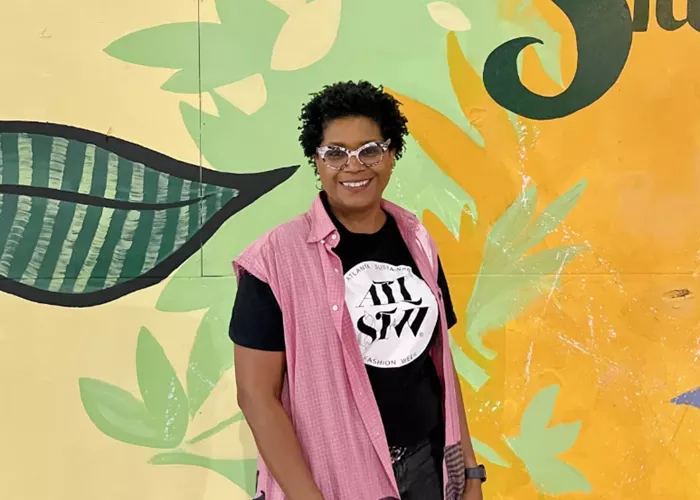On Saturday, November 16, Sustainable Fashion Week (SFW) Atlanta marked America Recycles Day with a free public event: the Conscious Couture Fashion Museum and Gallery. The exhibit aimed to raise awareness about the environmental and social impacts of waste, urging visitors to make more eco-conscious decisions in their daily lives.
Among the standout displays was a collection by artist Nancy Judd, featuring fashion creations made from recycled materials like cassette tapes and video tapes. Judd’s work, part of the “Recycle Runway” exhibit, underscores the importance of conservation through fashion.
The event, held throughout the day, offered a range of eco-focused activities, including a community closet, a clothing repair station, a documentary screening, and a panel discussion on sustainable fashion. Attendees also had the opportunity to explore the Recycle Runway exhibit, where Judd’s innovative designs highlighted the potential of trash to become fashion.
SFW Atlanta is a multi-day event that showcases designers and brands dedicated to sustainable practices. Founded in October 2021 by Tanjuria Willis, the event serves as a platform to address the growing issue of textile waste, a major pollutant in landfills, particularly from fast fashion.
Willis noted that her research revealed many landfills are located near Black and Brown communities or other underserved areas, exacerbating environmental issues. She believes that fast fashion’s harmful impacts go beyond waste, extending to chemical pollution and health concerns, which are often overlooked in the mainstream fashion conversation.
“I felt that the fashion industry was too focused on superficial aspects and wasn’t connecting the dots between fashion and its harmful effects on health and the environment,” Willis said. “We need to address the chemicals used in production and their impact on our health.”
She is encouraged by the rising popularity of thrifting and clothing swaps, especially among younger generations. For Willis, these practices represent creativity and authenticity in fashion. “Taking something old and making it new again is the epitome of creativity,” she added. “It’s a unique piece that you won’t find anywhere else.”
Willis hopes that in the next two to three years, the conversation around sustainable fashion will expand to address the broader environmental challenges posed by the industry, from water contamination to microplastics in the oceans.
“It’s not just about fashion; it’s about manufacturing, water use, chemical pollution, and energy demand,” she said. “I hope that both consumers and companies start to connect the dots between fashion and these global issues.”
According to the World Resources Institute, fast fashion is responsible for 2-8% of global carbon emissions and is the second-largest consumer of water worldwide. The industry also contributes significantly to industrial wastewater pollution. With more than 60% of materials used in fashion production derived from plastic, the industry is a major driver of microplastic pollution, which is now being found in human bloodstreams and waterways.
A Global Effort for Sustainable Fashion
As the fashion industry’s waste problem is global in scale, the solutions must also be interconnected. Jacob Veerman, Dutch Consul General in Atlanta, emphasized the importance of sustainability in business, noting that Dutch companies and American companies alike are increasingly prioritizing social justice and environmental responsibility.
Veerman shared his firsthand experiences from working with the Asian Development Bank, where he saw how traditional fashion practices were damaging both the environment and the people working in the industry. He also highlighted the issue of child labor, which is exacerbated by fast fashion.
In collaboration with Tanjuria Willis, Veerman hopes to foster knowledge exchange between Atlanta and the Netherlands, particularly in the area of sustainable fashion. His spouse, Petra Veerman, is helping organize a visit for Atlanta designers to the Netherlands in May 2025, to learn from European sustainable fashion experts.
Petra Veerman noted that while sustainability in Europe is largely driven by companies, in the U.S., it tends to be more grassroots. She hopes that the collaboration between the two regions can help shift Atlanta towards a more company-driven approach.
“The challenge is raising awareness,” Jacob Veerman said. “Many consumers are unaware of the environmental impact of their fashion choices. We need to help them become more critical of what they buy.”
The Future of SFW Atlanta
SFW Atlanta has recently become the permanent home for Nancy Judd’s couture collection. Willis shared that the organization is actively seeking a permanent space to house the collection, with plans to create a museum experience. The new location will also serve as a hub for community engagement, offering everything from runway shows to workshops and monthly marketplaces.
Looking ahead, SFW Atlanta is already planning its next major event—Atlanta Sustainable Fashion Week—set to take place in Fall 2025. The event will build on the momentum of this year’s activities, continuing to raise awareness and inspire eco-conscious change in the fashion industry.
Related topics:
- Prince William Promotes Sustainable Fashion in Vintage Blazer, Proving Secondhand is Just as Good as New
- Burberry Launches “Critical” Strategy as Sales Dive
- Kendall Jenner Stuns in a Tom Ford Leather Blazer

